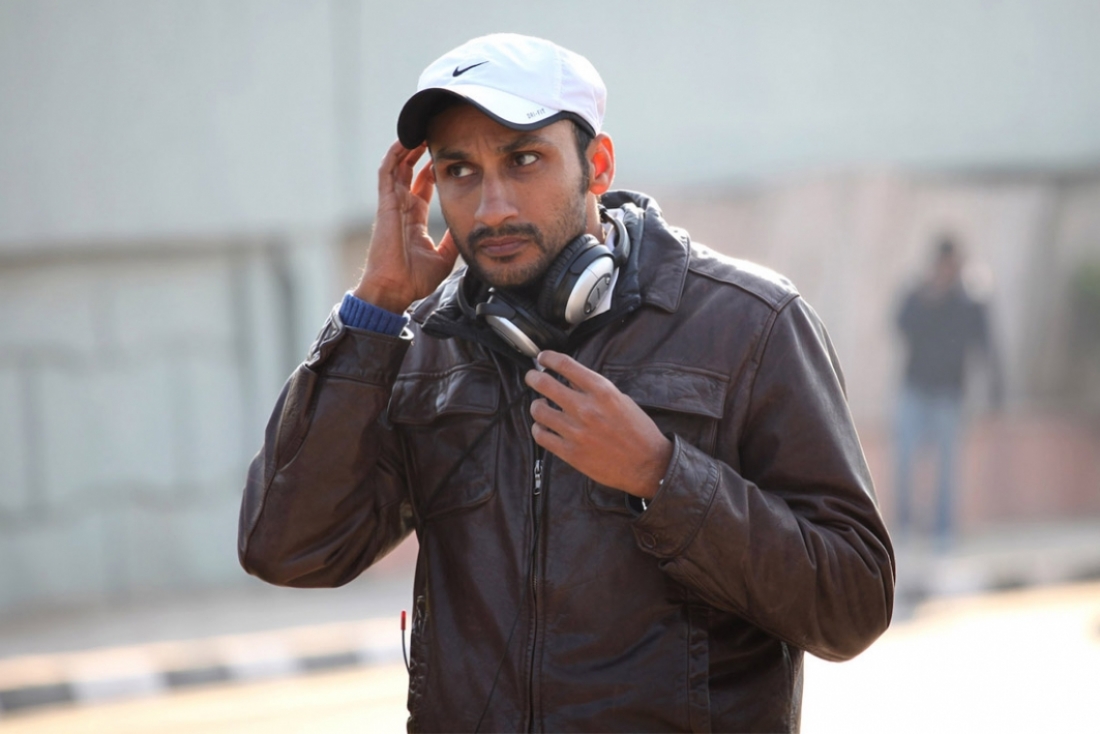

Raj Amit Kumar directed his first feature film Unfreedom in 2015 starring Adil Hussian and Victor Banerjee. It was banned in India by the Censor Board of Film Certification (CBFC) on the basis that it would create homosexual interest in the viewers and incite communal violence resulting in crimes in the country. Although the film was banned, he screened the film in over hundred locations including India and the US, receiving positive responses that made him question the hypocritical ground on which the Censor Board had banned the film. On April 1st, 2018, Netflix released the film internationally breaking the barriers set by the Board, making the content available worldwide.
Unfreedom is a contemporary thriller based in a society torn apart by political, religious and sexual turmoil. Alternating between New York and New Delhi, the film combines two powerful stories about religious fundamentalism and intolerance caused by sexuality. One of which follows a Muslim terrorist Husain (Bhanu Uday), attempting to silence a liberal Muslim scholar Fareed (Victor Banerjee). The other story is about a young woman Leela (Preeti Gupta), who defies her devout father Devraj (Adil Hussain) and escapes an arranged marriage because she is secretly involved in a taboo lesbian romance with Sakhi (Bhavani Lee).
The film reflects the issues our society faces and has failed to confront, and where we have turned an ignoring eye to it as we are too afraid to speak up about it. Raj Amit Kumar, who passionately feels about these issues and who is fearless in addressing them has taken this stance to lead this confrontation against pretense. The film also portrays the strength in beliefs about concepts of freedom, faith, family and love as narrated by its powerful actors.
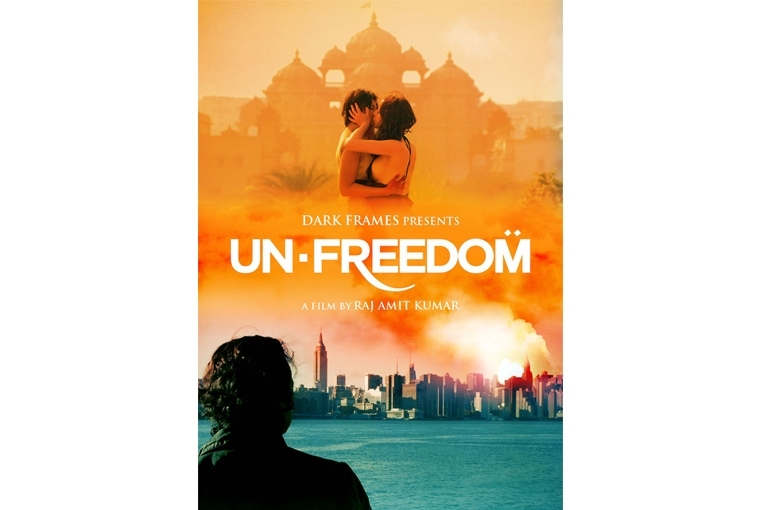
'Unfreedom' poster
'I was never afraid and I never will be. Making this film never changed anything for me', informs Amit Kumar. He wanted to show the present world without disguise and wasn’t afraid to narrate it in its true colours. Not distracted by the business side of moviemaking nor considering the reaction of the Censor Board and ‘self-censoring’ his ideas, he couldn’t be more proud of how the film had turned out to be. 'I don’t think this film would be what it is if I had those blinkers, and it would have diluted its honesty. And I’m so proud of that today. I’m not that kind of filmmaker who asks which audience it is for and who it is for. An honest filmmaker or any kind of honest artist would always create something from deep within themselves, that’s the only way something would be unique and hold it on its own ground. I made the film from that space and my future work is going to be from that space as well.'
The film marks his first directorial feature film debut. He has also produced the film under the banner of Dark Frames and co-written the screenplay with Damon J Taylor.The film’s technical team comprises of Oscar-winner Resul Pookutty (Slumdog Millionaire) who has done the sound design for the film and was nominated for the Motion Picture Sound Editors' 63rd annual Golden Reel Awards. The film is shot by award-winning cinematographer Hari Nair (Shutter, Kerala Café) and edited by Atanu Mukherjee, who debuted as a director with the acclaimed film, Rukh (2017).
Talking about the film’s release on Netflix, director Raj Amit Kumar said, 'I am glad that Unfreedom found such a popular platform like Netflix after the ban in India and the efforts of censorship guardians in India to stop the film. It also exposes the hypocrisy and divide between reality and fantasy of censorship system in India. There is no way they can control and censor content in the digital age, yet, they try their best to choke filmmakers like me who have something relevant to say that makes them feel threatened.'
Elaborating on the film’s ban by CBFC and it being labeled as one of the boldest Indian films ever, Kumar said, 'The boldness of something is always defined by what you are allowed to say or not in a society. The boldness of an artist is always defined by what others artist around him have not said or what they are not allowed to express. Thus, it is not the content in my film per say makes it bold, but in the context of a society in which it is told, it is the fact that we have become such a weak and conservative society where we are asked to shut up all the time. Our voices are being crushed unless we are chanting slogans that the powers to be and moral guardians are ok with.
And in today’s time, our art is being crushed in much more violent ways than ever before. Journalists are getting killed, films are getting banned for slightest of transgressions and the whole mediascape is turned into a trumpet sound. Any other vision, voice, an expression has to be curtailed. So I guess it is the boldest film ever because I did not give a damn about anyone or anybody. I didn’t care and I don’t think I will care in future as well. Unless artists take that approach and risk their well being, we will soon be living in a world where everybody is frightened to say anything truthful.'
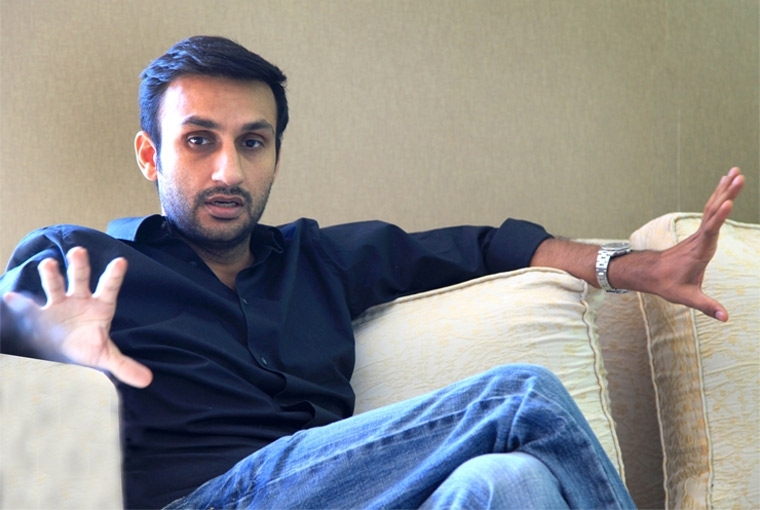
Director Raj Amit Kumar
Raj Amit Kumar graduated in Masters of Arts in Cinema and Media Studies from City University of New York (CUNY) in 2006, where he received the George Custen Memorial Award for Academic Excellence. Kumar finished his Ph.D. coursework in Cinema and Media studies at Southern Illinois University (SIUC) before beginning work on his first feature film, originally titled Blemished Light, the script of which won the First Prize in Faculty Screenwriting Award at University of film and Video Association (UFVA) 2009.
Also a media academic, teacher, and writer, Kumar has taught cinema theory and history at both his alma maters, City University of New York and Southern Illinois University College (2005 – 2009) and his writings and research papers have been published and presented at various conferences.
In early 2012, Kumar established Dark Frames as a development and production company. Its primary goal is to develop and produce provocative independent films.
The film which is not biased towards any issue discussed it-religious, cultural or sexual, shows the 360-degree view and paints them in different perspectives that show both the sides of the same problem. Then why has the Censor Board of Film Certification (CBFC) of India banned something that is the reality of the world we reside in? Does this mean that our rights have been curbed? What about the freedom of speech and expression? What does the future hold? Raj Amit Kumar explains shares his views and what being a filmmaker means to him.
Unfreedom explores the issues and concerns faced by our society. What inspired you to address these issues rooted in the politics of religion and sexuality?
I don’t know if we even need any inspiration for that. I mean this is the society we live in. If we are not going to address the world that we are living in, then what else are we going to make? So I don’t think there was any need for any kind of inspiration for a story like this. It is a story of contemporary times, a story of brutality, oppression, ‘unfreedom’, that exist around us. And for me in general, the stories of ‘unfreedom’ is what excites me, and those are the subjects that I want to address hoping that we all can probably come together and at least think about, in terms of what needs to be done and what can’t be done.
The film portrays strong, daring and uninhibited characters that stand for their own personal beliefs. What thought went into character building?
I don’t think all of my characters are uninhibited-all of them had to make strong choices. They do have inhibitions, they are struggling with issues. I think all my characters were put in a corner to make a strong choice, that stands as the quote of the film as well “Its when we are pushed in the corner and the choices that we make at that time that define who we are “. So I come from a very existentialist philosophy where I believe that no matter how tough our situation is, it’s our choices in everyday life that shapes and reshapes the world. There is no place where we can say we have no choice because we always have a choice. Even in the worst of a situation, we have choices. These are not just individuals; they are representative of a certain section of society, a certain mindset. And hence, by picking and creating one of that character, and taking him to a point where he has to make that choice and what choice he made, is my way of showing the world what is happening around us and what are the possibilities. The biggest and most interesting thing for me while creating these characters was creating mirror images of them; in two different kinds of the stories-one story completely deals with Muslim warfare and the other story deals with violence against homosexual community in India. And in both the stories, I wanted to create mirror images of characters-so if there is ‘Husain’ in one side of the story, there is ‘Leela’ on the other side of the story. Both are in a way fundamentalist in their space and both are crushed in a corner. If you take ‘Sakhi’ and ‘Fareed’, they are fundamental characters-both come from a higher-class status, both think that they can change the world through their art and with their writings. Same way, if you take ‘Najib’ and ‘Chandra’, they are mirror images-‘Najib’ is somebody who was sort of a solider for the fundamentalist but having been in the war now have made him realize the truth of that war, but he doesn’t have a place to go, he doesn’t know what he can do now, except for just trying to save ‘Husain’. Same way if you look at ‘Chandra’ who is a homosexual, she married into heterosexuality, and now she is pregnant, but she isn’t happy and doesn’t know where to go and what to do, except for trying to save ‘Leela’ to not make the wrong decision. What I’m trying to say is that in my character construction, the most important thing was to take two very big different identities, in two different parts of the world, and then construct mirror characters that will help us understand a third more important philosophical idea, which is not just about a story of homosexual life or of a religious life that is trapped into violence, but something more important- Why and how identities are crushed? Or what, in a broader sense, ‘Unfreedom’ means in our society? What’s the relationship between sex, violence, religion, politics, shame, honour and all those things? So it was a broader thing that I wanted to try to achieve.
“"Its when we are pushed in a corner and the choices that we make at that time that define who we are"”
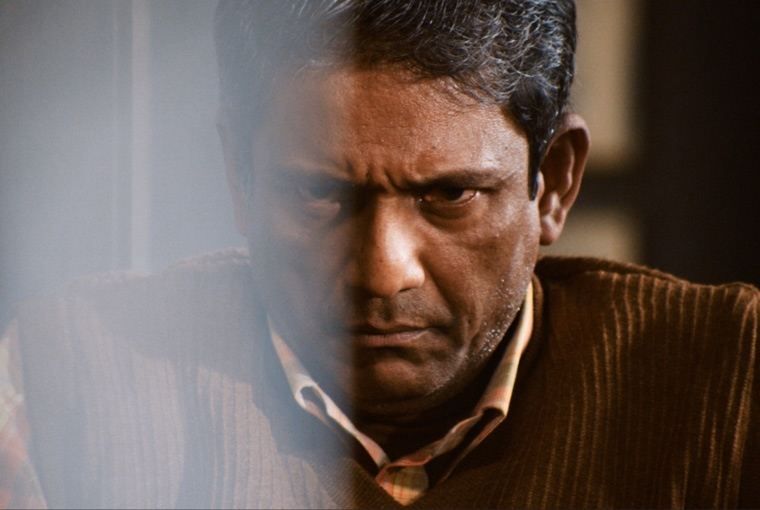
Adil Hussain as Devraj in the movie
What informed you of the decision that the characters were played by the right actors?
That’s a complicated saying. Any director may always have a vision of ‘this is how my script is, and this is the person who can play my character the 'best’, when I say, 'best' it’s what is in their mind. Filmmaking is always a fluid process, it happens as we move along, things change everyday. There were some happy coincidences when it came to casting, but when those actors came in, the way I was going to express a certain character shifted because of how these actors looked and performed. So there’s always this organic shift. And it’s a beautiful process to see that sort of painting coming across when you have picked up a different brush. So I was very pleased to see Victor Banerjee coming on board and he was not the first choice, but then when I approached him after hearing no from some other people, he read the script and he was just completely for it and I today believe that it would have been a huge mistake if it weren’t him.
How did you maintain the thin balance between the thriller and reality?
These clear demarcations never work. I think they work more for the theorists and reviewers. In the making of a film, terms like reality, fantasy or realism doesn’t work like that. Film is a film, it’s a construction, there’s nothing real about it. The question of realism always comes from an approach of a filmmaker in the sense of how he wants to address a socially relevant realist subject. So you can take the same subject and make an animated film out of it, but that animated film might be dealing with reality in a more “social realist fashion” than a Bollywood film would ever do it. These are just styles of filmmaking and whatever I made it became for me, a kind of eclectic style of mixing things and I’m okay with that. I did not have a style before making the film; I wanted it to be an organic process in terms of what I want to say and how I want to say, and at the end of the day when it came out I was happy with that. Film has this deep-rooted realist philosophical aspect to it, which I guess comes from a place influenced by what I’ve read and seen. And it also has the social –realist aspect to it because of the part of the world I grew up in; the things I saw in front of my eyes-the religious violence. I was born in Muzaffarnagar, a city that is laid with religious violence every day. I was growing up at a time of ‘Babri mosque demolition’, people cutting each other’s throat every day. So I’ve seen all that growing up and all those things influence my work.
What were the challenges in making the movie?
I could write a big book! Biggest challenges are always the financial challenges. Something that is of this size and by somebody who is a complete outsider from the film industry and me, somebody who has no relation when it comes to this world and this industry. And on top of that, trying to tell a story like this unlike a ‘Bollywood masala’ as the first film. It always 'stop and go', and it took a very long time to make the film after its conception. Casting was another big challenge. Asking this kind of a sexual exposition in a film that is for India, in this kind of a way by a first-time filmmaker is not easy, as they have to trust your aesthetics and sensibility. So it was a huge thing to find these actors, given the fact that actors in India are scared that if they take on this kind of a role, what their career is going to be after that. Hats off to both my actresses, Preeti Gupta and Bhavani Lee in being so courageous and to trust completely in me and that what we are making is worth it and I know they are proud of it today. But I know what kind of a difficult decision it was for them at that point in time.
Then there were all the challenges of shooting this film in India and the complications that we dealt with. Also shooting it in two different countries over a year apart from each other. How do I put it? It was all a beautiful nightmare.
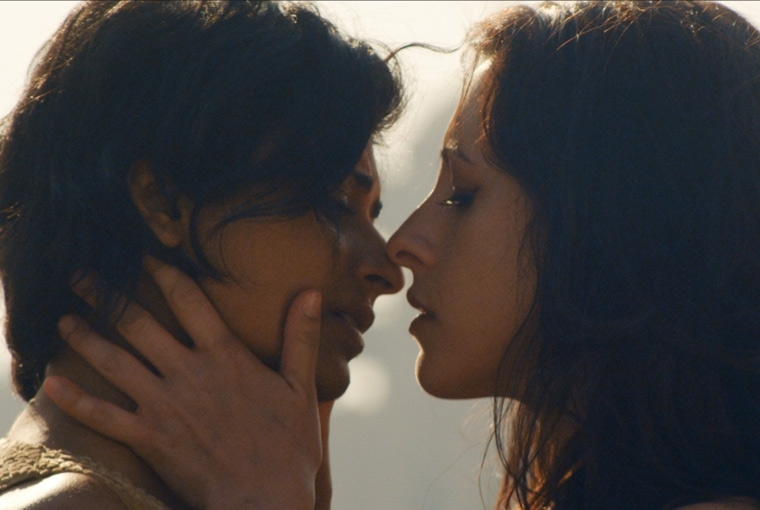
Preeti Gupta and Bhavani Lee as lovers Leela and Sakhi
The Central Board of Film Certification (CBFC) banned the film to be released in India. Did you expect this to happen? What was your reaction to this judgment?
Nobody would ever expect their voice to be cut off in their own country or anywhere. I had no reason to expect that. Yes, people around me were all saying how is this going to pass and I said I don’t know, but can I be hopeful? I have something to say and I have said it and I’ll see what happens. Why should I self-censor? That’s the biggest goal of censorship anywhere in the world- to put the rest of the society in a self-censorship mode. Before even trying, we shut our mouth. We don’t say certain things in certain ways so that the censorship doesn’t have to do that job all the time. They just need to shut one voice and they have sent the message to the rest of the society, and the rest of the society should fall in place, that's their goal. So I was not going to self-censor myself, I was going to take a chance and go in front of them and show this is what I’m going to say, and yes, they banned it.
I have no thoughts in saying that censorship in India is the most horrific and unconstitutional institution. If we as a society since our Independence can’t fight against it, then there is something wrong in what we do. We have become a society that takes the abuse and is okay with it. We don’t have the courage to come together and fight against it, which is the sad part. Censorship should not just exist in India in any form or fashion. The freedom of speech and expression is something that is absolute. There are people who fought for this right in the Indian history. It is not about ‘you can have freedom of expression, but -not that-‘. There is no such thing- either it is absolute and it exists or it doesn’t exist. I call for action, and say censorship in India should not exist in India. See who comes along and ready to fight- it has to be a very sustained fight.
Since its release on Netflix, how has the public reacted?
I do not have any parameter to judge what people are saying about the film. It just came out on April 1st 2018 and I have just been getting congratulation messages from various sources, and I do not have any other way of judging otherwise. But we did, even after the ban, about hundred screenings of the film, and everywhere we did the screening, there was a positive response in India. So I don’t understand what the actual issue was. Why are you banning something which when we go and show to hundred people in a room, people have praise for the film? It’s hard to express that.
The reaction the censor board thought would evoke was hundred percent wrong. They said whoever is going to watch the film is going to become homosexual and there would be communal violence and people would start killing each other. When we did hundred screening, nobody in the audience started beating each other up and I don’t know if they turned homosexual! I mean I don’t know how censor board has a way of figuring that out, but they just have a shot-gun approach. How can somebody have a power to say this is to be seen and not to be seen or this is what it will do? That’s the bigger question here. As long as you have a censor institution and people sitting there, they are going to do their job. So whichever mindset they come from doesn’t matter- that job is wrong. We should not have a job in the country that tells what them what they should watch or not.
What more can we expect from a Raj Amit Kumar film in the future?
As long as I can stay honest to what I truly want to say in the world I’m in, I think I will be okay and that’s what you can expect.
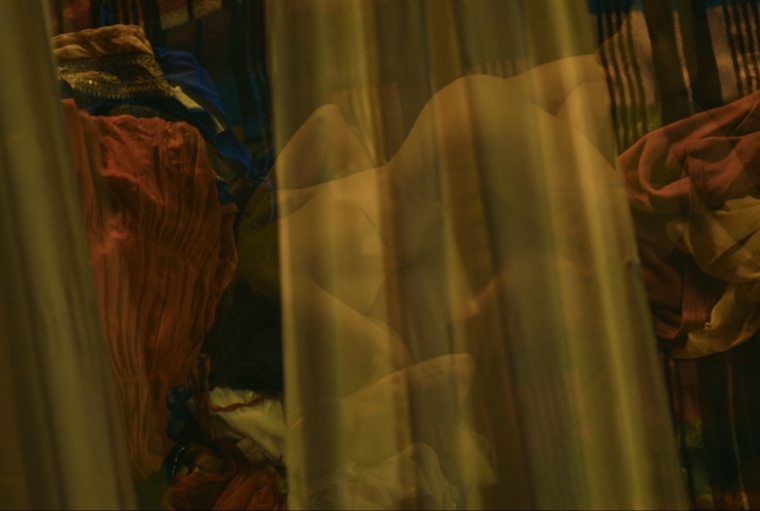
A love-making scene in the film
Presently, Raj Amit Kumar has almost finished shooting his second feature film Brown, which is the story of an illegal immigrant in Montana, and finding an eleven-year white orphan girl in the street. By means of their stories, we get to understand what it means to have or not have a home and address the concept of abandonment.
Unfreedom is produced by Dark Frames.
You can view the film on Netflix here: https://www.netflix.com/title/80041337
About Dark Frames:
Dark Frames is a new film and web Series development and production company set up by Raj Amit Kumar which is dedicated to bringing high-quality, independent films to international audiences. The company is recently in production with its second feature film Brown which is also directed by Raj Amit Kumar. And it is in the pre-production of Black Boots, a story of first Black Marines who went to World War II. The movie has a backing and support of Montford Point Marine Association and USA Marines. The company has also acquired Erotomania, a Novel by Francis Levy to be made as a Sex-Comedy in India.
Text Tony Jacob